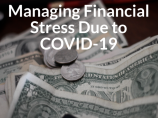Overcoming Worry About Money: Managing the Afterburn of Holiday Spending, Consumerism, and the Money Crunch of Inflation
Overcoming Worry About Money: Managing the Afterburn of Holiday Spending, Consumerism, and the Money Crunch of Inflation

One of the most taboo topics in our culture is talking about how much money we have and how we spend our money. If you are like most people, it is easier to tell your friends or therapist about your sexual experiences than to talk about your attitudes about money and spending habits. Why? Because many cultures glorify having lots of money and spending lots of money as the pinnacle of achievement. Pressure from media and culture equates shopping with entertainment and giving the perfect (expensive) gift, wedding or party with the quality and generosity of your love. In short, it takes great thought and effort to mindfully manage your money, so you avoid the temptation to overspend. In the United States, the average credit card debt is $22 thousand dollars, and the average home or apartment has over 300,000 thousand items! So, if you are worried about paying the holiday bills or which groceries to buy when you see the effects of inflation, you are not alone.
Consumerism is the belief “that the consumption of goods and services purchased in the market is always a desirable goal, and that a person's well-being and happiness depend fundamentally on obtaining consumer goods and material possessions” (Investopedia.com). The science of mental wellness has shown that consumerism, or materialism, is bad for mental health because it promotes a competitive mindset that values things over people. It misdirects you away from mindful living that prioritizes relationships. It makes you spend more than you should on gifts because you accidentally equate the perfect gift with fulfilling the consumer’s dream of having and giving all the right things. It makes you believe you and those you love will feel better and function better if you possess all the right stuff. It makes it inevitable you will overspend and join the ranks of those who worry about money.
Likewise, consumerism makes it more difficult to save money and spend within your means. Instead of asking, “What is the best way to spend what I have?” it pushes you to think, “What should I have?” It limits your creativity for finding ways to demonstrate love, to pursue hobbies or to find ways to live within your means. For example, we know that most people wear repeatedly wear 5-10 favorite pieces of clothing. So, having more than this means you are likely overspending, and creating a burden of worry for not getting your money’s worth out of what you own. Is it true you need new clothing each season? a special device for making perfectly shaped pancakes? Holiday themed bedsheets?
Consumerism convinces you that you are not good enough when you cannot purchase the things you want. Consumerism might even make you feel entitled and therefore envious of those who spend more and have more. No wonder worry about money and spending beyond your means is the most frequent cause of couples’ conflict.
The antidote is to become aware of your attitudes about money and spending and then to do the hard work of living within your means according to your values. Money should be a tool to address your basic needs and to express your values. To do this, you need to get clear about what matters most and then use your money accordingly. Here are questions to help you spend mindfully and according to your values.
1. What does my spending the past three months say about what matters most to me?
2. What does my worry about money say about my values? Does it express a desire for security? Financial independence? Power? Being loved?
3. If I have credit card debt that I cannot pay off in full each month, how much happiness do the things I purchased give me now? Do I regret any of my purchases?
4. Have I calculated the real cost of things I purchase on credit that I cannot pay off each month? Am I willing to pay that much for this item (real cost equals the interest you pay each month added to the purchase price)
5. Do I want to control how I spend my money, or do I want the culture of consumerism to control how I spend my money?
6. Am I willing to invest in my mental health by learning financial self-management skills, such as creating and following a monthly budget or learning how to pay off and avoid credit card debt?
Resources to consider:
https://care4yourfuture.rg/curriculum?gclid=CjwKCAiAzp6eBhByEiwA_gGq5D4kSdwASiQRLIeGGuJ_9YB58cJRr3JwaZsR1Te-05pKmUQsqFNORBoCNVsQAvD_BwE Free English and Spanish financial literacy materials
https://www.consumerfinance.gov/consumer-tools/educator-tools/adult-financial-education/tools-and-resources/ free information about understanding and managing various types of debt, creating budgets and getting assistance with managing debt and predatory lenders
https://debtorsanonymous.org/ 12-step program to overcome overspending, debt and victimization by consumerism


















